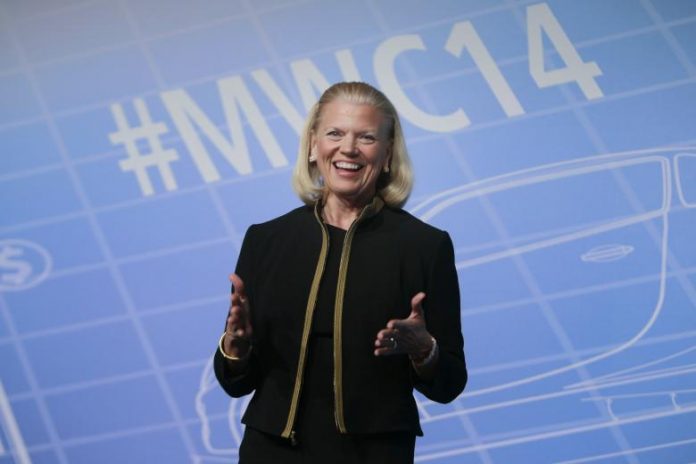In remarks in February at Mobile World Congress 2014 in Barcelona, Spain, Virginia “Ginni” Rometty, chairman, president and chief executive officer of IBM, spent several minutes explaining why she sees Africa as one of the great opportunities for IBM and for mobile technology. Below is the relevant excerpt of her remarks.
What are the three trends that are reshaping the technology industry?…Three words: Data, cloud, and engagement.
Data: I think of it as the world’s next natural resource. Cloud: Simply put, any process or IT delivered as a service. And the word ‘engagement,’ because I think it has forever changed how we engage but understand people at an individual level…
This is an interesting opportunity for a lot of countries around the world that don’t have the same infrastructure that had been built, whether in the U.S. or Europe, at different points in time. I think they’ve got an opportunity to leapfrog in some ways.
And you see a great rapid pace of change in China between social and mobile computing; and even just in the last six moths, a great rapid pace with cloud, mobile, social. So, rapid pace of change, but it is a chance — as I just said, this is about business models — to do new things.
And this is why I think in Africa as well — and not just because Africa had a mobile infrastructure to begin with. There is that saying, “necessity is the mother of invention” — that is going to be true. It led us to put the twelfth IBM research lab there. This is true, true research. There are 11, one continent didn’t have it and that was Africa. Last year we opened up in Nairobi.
There’s a reason we put the lab in Nairobi. The problems that we are all working out in the world, they are getting too big. You cannot bring the problem to research; you have to bring research to the problem. And as a result of it, you are going to leapfrog and come up with good enough solutions in all of these countries that don’t have previous infrastructure like that.
So, I think you’re going to get great, great innovation, particularly in areas like healthcare, coming out of this.
I’ve been to Africa four times in the last 12 months. I was just there a few weeks ago. I was always taught, “Steward for the long run.” I believe this next decade is going to be the decade that you’re going to see many different countries in Africa progress as opportunity for many of us. Many of you are there in different pieces. Mobile certainly is.
But the mistake people make, Africa is not one thing, obviously. It is 54 countries with very different, political regimes in place, different positions of maturity and the like. But, particularly in central/sub-Saharan Africa, this will be two steps forward, one step back, but it is still advancing forward, and there is enough stability in different places that this will proceed over this next decade.
This time I was in Nigeria and Morocco. But whether it’s been Kenya or Ghana, or Egypt, wherever we’ve been — we have a big business there already, but I believe we’re now in 24 countries across Africa — this next decade, I would urge people, this is the decade that this is going to begin take a forward inner leap because of: Of course, the demographics that are available; it will be, of course, the infrastructure that’s there; it will be stability that begins to form in many different places through political change that is there; and you are going to get the chance to re-invent businesses.
So I am quite excited about the kinds of different projects we’re working on there, and we’re going to stay with it. It’s why we brought Watson to Africa as well. In this case it’s going to work on cervical cancer to start, and education, as I mentioned.
We made a couple of other announcements: We put up innovation centers, and we offered all of our software as a service, free, to all universities. They can grow the next generation workforce. That comes from analytics.
I saw a great thing that teamwork did out of Kenya. If any of you have worked on traffic mobilization, traffic management, traffic congestion sort of projects, and if it was London, if it was Brisbane, if it was Sao Paulo, these are big infrastructure projects.
There, they had nine cameras. Nine low-grade CCTV-kind of cameras out in Nairobi. And the team said, “you know what, we’re not going to put a whole infrastructure in here. But I bet we can predict where these cars are going to go, just with that data, just with what we have. That’s it. And, between what they know from cell phones, is, obviously, positioning. It’s a great example of what the possibility is…
I would position and underscore this point of remaking enterprise IT for this era. If you go back in our history, just about every major invention came out of IBM labs when it comes to data and analytics.
And so we’ve placed three big bets around the world of data and analytics, around the world of cloud; and when I say “engagement,” it is enterprise, social, mobile, underscored by security, and it’s understanding it from the enterprise perspective, and how to do those things. I think that is what we uniquely bring.













